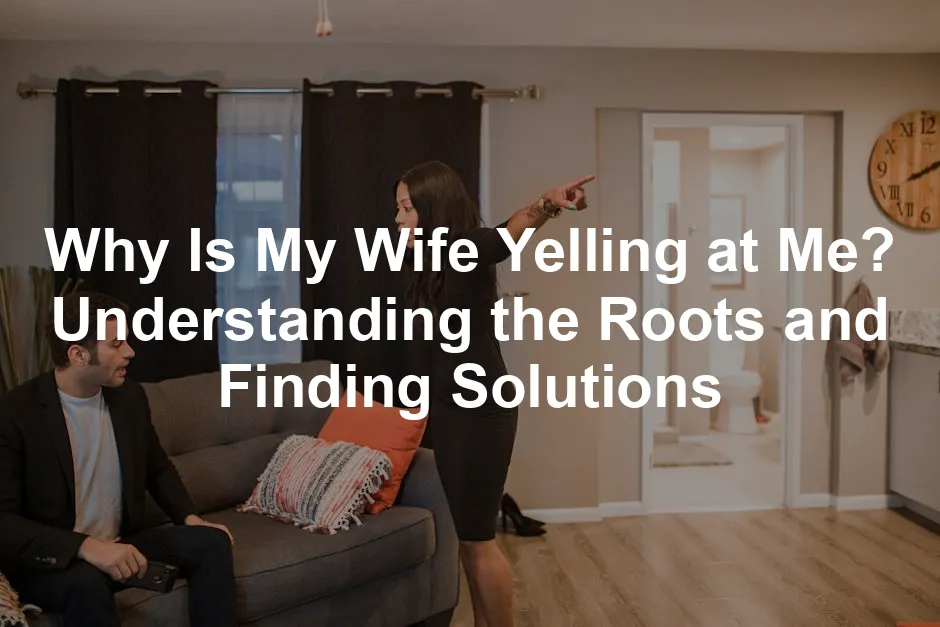
Why Is My Wife Yelling at Me? Understanding the Roots and Finding Solutions
Introduction
In the rollercoaster of marriage, occasional yelling may feel like an unexpected twist you never signed up for. If you’re wondering, “Why is my wife yelling at me?” you’re not alone. This question resonates with thousands of men seeking answers and solutions. Yelling can stem from emotional turmoil, miscommunication, or unresolved issues.
Think of it this way: when you leave your socks on the floor one too many times, it’s not just the socks that trigger her outburst. It’s the accumulation of moments where she feels unheard or overwhelmed. This post aims to unveil the reasons behind this behavior, explore its implications, and provide actionable strategies to foster better communication. Spoiler alert: it’s not all about the socks left on the floor!
Yelling in a relationship doesn’t always mean the love is gone. Sometimes, it’s a cry for help or a desperate attempt to be heard. The key is to understand the underlying emotions at play. Whether it’s stress from work, feelings of neglect, or simply a bad day, these factors can lead to raised voices.

Speaking of understanding emotions, why not explore some insightful literature? A great starting point is “The 5 Love Languages: The Secret to Love That Lasts” by Gary Chapman. This book can help you decode your partner’s love language and maybe even put an end to some of those misunderstandings!
In this blog post, we’ll break down the common scenarios that lead to yelling, helping you gain insights into your wife’s feelings. By doing so, you can become more empathetic and responsive to her needs. Remember, an open dialogue can go a long way. Stay tuned as we reveal practical solutions to transform conflict into constructive conversations.
Summary
Yelling in a marriage often signals deeper issues that can erode the foundation of a relationship. From emotional stress and communication breakdowns to unmet needs, there are myriad reasons why one partner might resort to shouting. This article will explore seven primary causes of yelling, including unresolved issues, stress, and differences in communication styles.
We’ll also discuss the potential for abuse, emphasizing the importance of empathy and how to effectively communicate your feelings without escalating the situation. It’s crucial to identify when yelling becomes harmful and what steps to take if it does. By addressing these factors head-on, couples can work towards a healthier, more harmonious relationship.
Understanding that yelling can stem from various sources, like financial worries or mental health struggles, helps put things into perspective. The goal here is to foster a nurturing environment where both partners feel valued and heard. By learning how to navigate these emotional waters, you can strengthen your bond and create a more peaceful home life.

If you’re looking for a practical guide to improve your relationship, consider picking up “Hold Me Tight: Seven Conversations for a Lifetime of Love” by Dr. Sue Johnson. This book can help couples engage in meaningful conversations that strengthen their bonds.
Understanding Yelling in Marriages
The Emotional Context
Yelling in a marriage often stems from emotional triggers. It’s like a pressure cooker; once the steam builds up, something’s got to give. Your wife might raise her voice due to feelings of frustration, anger, or sadness. These emotions sometimes stem from unresolved issues. If topics remain unaddressed, they can bubble to the surface during a disagreement.
Stress is another significant player in this emotional symphony. Imagine your wife juggling work deadlines, family obligations, and household chores. When external pressures mount, her frustration can spill over, leading to yelling. It might not be about you at all. Instead, you’re just the unfortunate recipient of her pent-up emotions. Think of it as an emotional tornado, where outside factors—like a tough day at work or family drama—feed into her internal turmoil. In these moments, she may feel overwhelmed, leading to explosive expressions, often misdirected at you.
Recognizing these emotional triggers is vital for both partners. It allows for a deeper understanding of why yelling occurs. Once you pinpoint the stressors, you can begin to tackle them together. Whether it’s finding ways to support her during stressful times or simply lending an ear, addressing these emotional contexts can help in reducing the frequency of yelling.

Understanding emotional triggers can greatly enhance your relationship and reduce conflicts. why is understanding emotional triggers important for stress relief
Common Misconceptions
Many people believe that all couples who argue are in toxic relationships. This stigma can be misleading. Disagreements are a normal part of any relationship. They reflect the different viewpoints and needs of each partner. Think of it as a dance; sometimes, you step on each other’s toes, but that doesn’t mean the partnership is doomed.
Healthy conflict is about open communication and understanding. It’s not about hurling insults or belittling one another. Healthy disagreements can lead to growth and a better understanding of each other. On the flip side, when yelling devolves into patterns of emotional abuse, it crosses a dangerous line. Emotional abuse includes constant criticism, threats, and control, which can be psychologically damaging.
Understanding this distinction is crucial. Couples should recognize that addressing conflicts respectfully can strengthen their bond. By fostering an environment where disagreements are handled constructively, partners can avoid the pitfalls of unhealthy shouting matches. Embracing the notion that it’s okay to disagree can pave the way for healthier communication and a more resilient relationship.

3. Emotional Triggers
Yelling often reveals deeper emotional layers. Think of it as a volcano: when pressure builds, it erupts. Past traumas or unresolved issues might be lying beneath the surface. Your wife’s raised voice could be a response to feelings she hasn’t processed. For instance, if she faced criticism in her upbringing, her emotions may flare up more easily. It’s not about you; it’s about her history.
When she yells, it can feel like a personal attack. But remember, it’s often a manifestation of her internal struggles. Understanding this can help you respond with empathy. Instead of reacting defensively, try asking gentle questions. What’s bothering her? What emotions is she feeling? Creating a safe space for her to express these feelings can help diffuse future shouting matches.

4. Feeling Overwhelmed
Life can sometimes feel like juggling flaming swords. Your wife might be dealing with work stress, family responsibilities, and house chores all at once. When life gets hectic, it’s easy to misdirect that stress during conflicts. The dishes piling up might not just be about cleanliness; they could symbolize her feeling overwhelmed.
When she yells, it might not be about the specific issue at hand. It could be her way of expressing that she’s reached her limit. As a partner, you can help by recognizing her stressors. Offer to share the load. A small gesture, like taking over a chore or simply listening, can work wonders. This support can ease her burden and potentially reduce those yelling episodes.

To enhance relaxation at home, consider investing in an Aromatherapy Essential Oils Set. The soothing scents can create a calming environment that helps both of you unwind after a long day.
5. Disparity in Gender Roles
Traditional gender roles can create unbalanced stress levels in a partnership. Often, women carry the emotional and mental weight of the household. If your wife feels this disparity, it might lead to frustration and, ultimately, yelling. She may feel as if her efforts go unnoticed, leading to a build-up of resentment.
Communication plays a crucial role here. Discuss responsibilities openly. Do chores feel equally shared? Is she feeling overwhelmed? Taking time to evaluate these dynamics can foster a more balanced partnership. When she feels supported and recognized, her stress levels may decrease, leading to fewer explosive moments.

6. Seeking Validation
Everyone wants to feel heard, especially in a relationship. If your wife is raising her voice, it could be her way of expressing that she feels ignored. The louder she gets, the more urgency she feels to be validated. It’s not just about being right; it’s about being understood.
To combat this, practice active listening. Repeat back what she says to show you’re engaged. Acknowledge her feelings and let her know that her voice matters. This approach can transform yelling into a more constructive dialogue. Instead of raising her voice to be heard, she may feel comfortable expressing herself calmly.

7. Lack of Resolution Skills
Conflict resolution isn’t a skill everyone learns. If your wife doesn’t know how to resolve issues calmly, yelling may seem like the only option. This cycle can lead to escalating conflicts rather than solving them.
Providing tools for effective communication is essential. Introduce techniques like “I” statements to express feelings without blame. Encourage her to take a break during heated moments to cool down. Seeking couples therapy can also help both of you learn resolution skills together. By addressing these gaps in skill, you can work towards healthier communication patterns.
The Implications of Yelling
Emotional and Mental Health Effects
Yelling can take a toll on both partners’ emotional and mental health. The impact isn’t limited to just one person. It can create an environment of anxiety, leading to feelings of inadequacy and depression. For the partner being yelled at, it may feel like walking on eggshells, constantly fearing the next outburst. This fear can lead to emotional detachment and resentment over time.
Moreover, yelling often creates a cycle of negativity. Each episode can chip away at the relationship’s foundation, making it harder to communicate effectively. When stress levels are high, it’s essential to understand that regular yelling can lead to long-term emotional scars. Seeking support or counseling can help both partners break free from this damaging pattern and foster a healthier relationship.

Impact on Children
When children witness yelling and conflicts, the effects can be profound and long-lasting. Imagine a young child hiding under the bed, covering their ears during a heated argument. This scenario is all too common. Research shows that children exposed to frequent yelling may develop anxiety and behavioral issues. They often feel caught in the middle and may struggle to form healthy relationships as adults.
Kids learn from what they see. If they observe their parents yelling, they might think that this is an acceptable way to express emotions. They could adopt similar communication styles, perpetuating a cycle of conflict in their own relationships. The emotional atmosphere created by yelling can lead to feelings of insecurity and fear. These children may experience difficulty concentrating in school and may have trouble forming friendships.
Moreover, the impact isn’t just emotional. Studies suggest that children who witness domestic conflicts are at a higher risk for developing mental health issues. This includes anxiety, depression, and even post-traumatic stress disorder (PTSD). The chaotic environment can make them feel unsafe, leading to a lack of trust in their surroundings and caregivers. It’s crucial for parents to recognize that their behavior shapes their children’s understanding of conflict and resolution.

Recognizing Abuse
It’s important to know when yelling crosses the line into emotional abuse. Emotional abuse is often subtle but can have devastating effects. It includes behaviors like constant criticism, manipulation, and controlling actions. Yelling can be a gateway to these behaviors. If your partner raises their voice frequently, it may indicate a pattern of control.
Statistics reveal that about one in four women experience some form of domestic violence, which includes emotional abuse. This doesn’t mean that all yelling is abuse, but it’s essential to recognize the signs. If the yelling is accompanied by threats, insults, or attempts to control your behavior, it may be time to seek help.
Signs of emotional abuse include feeling afraid during arguments, being belittled, or having your opinions dismissed. If you find yourself justifying your partner’s behavior or walking on eggshells to avoid conflict, these are red flags. It’s not just about the yelling; it’s about the overall dynamic in the relationship.

When emotional abuse is present, it’s crucial to take action. Reach out to support services or professionals who can help you navigate the situation. You deserve to feel safe and respected in your relationship. Recognizing the distinction between yelling as a conflict mechanism and as a tool of abuse can be the first step towards healing and resolution.
Strategies for Addressing Yelling
1. Communication Techniques
Active listening and using “I” statements are powerful tools in de-escalating conflict. Active listening means truly hearing what your partner is saying, rather than planning your response while they speak. It’s about showing genuine interest in their feelings. Try to summarize their points back to them, ensuring you understand their perspective. This simple act can make your partner feel valued and heard.
“I” statements help express your feelings without placing blame. For instance, instead of saying, “You always yell at me!” try, “I feel hurt when you raise your voice.” This approach shifts the focus from blame to personal feelings, reducing defensiveness. By owning your emotions, you create space for constructive dialogue.
Pair these techniques with a calm demeanor. When tensions rise, take a deep breath. Responding calmly helps set a positive tone for the conversation. The goal is to foster understanding, not to win an argument. With practice, these techniques can transform confrontations into opportunities for growth and connection.

2. Setting Boundaries
Establishing clear boundaries regarding acceptable behavior is vital in any relationship. If yelling has become a norm, it’s time to set limits. Start by having an open conversation about how yelling affects both of you. Express that while disagreements are normal, raising voices is not acceptable.
Decide together on consequences for crossing these boundaries. For example, if yelling occurs, agree to take a short break before reconvening to discuss the issue calmly. This pause allows emotions to cool and prevents escalation.
Boundaries aren’t just about stopping unwanted behavior; they also promote respect and understanding. By establishing mutual expectations, you create a safe space for both partners to express their feelings. Remember, healthy relationships thrive on respect and open communication. Setting boundaries can help you achieve that balance.

3. Seeking Professional Help
Couples therapy and individual counseling can be transformative tools for improvement. Professional help provides a neutral space where both partners can express their feelings without judgment. A therapist can facilitate discussions and help you develop effective communication strategies.
Therapy isn’t just for when things get tough; it can also be a proactive measure. Learning to communicate better before conflicts arise can strengthen your relationship. Individual counseling can also help each partner work through personal issues that may contribute to yelling.
If you’re hesitant to seek help, consider the benefits. Many couples find that therapy improves their overall relationship satisfaction. With the right support, you can develop healthier patterns of interaction. Investing in your relationship is an investment in your future happiness.

4. Stress Management Techniques
Stress can be a sneaky culprit in marital conflicts. When life gets overwhelming, it’s easy to misunderstand one another, leading to raised voices. So, how can you tackle this stress monster? Here are a couple of techniques that might just do the trick.
First up, mindfulness. This isn’t just for yogis in serene studios. Mindfulness helps you stay present. It encourages both partners to focus on their feelings without judgment. Try setting aside a few minutes each day for deep breathing or meditation. Even a quick five-minute session can create a calmer perspective. Apps like Headspace or Calm can guide you through simple exercises.
Next, let’s talk exercise. Physical activity is a fantastic stress-buster. It releases endorphins, those magical little hormones that make you feel good. Whether it’s a brisk walk, a dance-off in the living room, or hitting the gym, moving your body can lighten the emotional load. Plus, it gives you something to bond over. Why not work out together? It’s a fun way to connect and blow off steam.
And hey, if you’re into yoga, a good Yoga Mat can make all the difference in your practice. It’s a great way to release tension and find balance.
These stress management techniques can create a more peaceful atmosphere at home. By prioritizing your mental well-being, you’re laying the groundwork for healthier communication, reducing the chances of those yelling matches.

5. Building Empathy
Empathy is like the secret sauce of any successful relationship. It’s about understanding and validating each other’s emotions. When your wife raises her voice, it often signals deeper feelings that need attention. Instead of reacting defensively, try to listen. Ask her what’s bothering her and really hear her out.
Validating emotions doesn’t mean you have to agree with everything she says. It’s about acknowledging that her feelings are real and significant. Phrases like, “I understand that you feel overwhelmed,” can go a long way. This simple acknowledgment can soften the atmosphere and pave the way for more constructive conversations.
Building empathy also involves sharing your feelings. Let her know how her yelling affects you, but do it with kindness. For instance, instead of saying, “You always yell at me!” try, “I feel hurt when voices get raised.” This approach invites her to reflect on her actions without putting her on the defensive.
Empathy nurtures connection. When both partners feel understood, it creates a safe space for open discussions. Remember, it’s not about winning arguments; it’s about fostering a loving environment where both of you can express yourselves freely.
Conclusion
The journey through marriage is not always smooth, and yelling can become a symptom of deeper issues that need addressing. Understanding the root causes of why your wife might yell at you is the first step toward resolving conflicts and improving communication. By fostering an environment of empathy, respect, and open dialogue, couples can navigate through their challenges together.
Remember, it’s not just about avoiding yelling; it’s about building a healthier, more fulfilling relationship. Open conversations, stress management techniques, and empathy can make all the difference. So, the next time things get heated, take a moment to breathe and remember: you’re on the same team. A united front can turn those heated moments into opportunities for growth. Embrace the journey together!
FAQs
What if my wife’s yelling is abusive?
Recognizing the signs of emotional abuse is crucial. If yelling becomes a tool for control, constant criticism, or manipulation, it crosses a line. Emotional abuse is insidious and often goes unrecognized. If you feel threatened or unsafe, it’s vital to seek help. Resources like domestic violence hotlines offer support and guidance. Remember, you deserve to feel safe in your relationship.
Can yelling ever be constructive?
Yelling, in some contexts, may serve as an emotional release. However, it becomes problematic when it transforms into harmful behavior. Healthy expression of emotions can occur without raised voices. The key is to recognize when yelling becomes a pattern of negativity. Effective communication should be the goal, not merely winning an argument.
How can I talk to my wife about her yelling?
Approaching this topic requires sensitivity. Choose a calm moment to express your feelings. Use “I” statements to convey how her yelling affects you. For instance, share that you feel hurt when voices are raised. This method encourages open dialogue without placing blame. Think of it as an invitation for her to reflect on her behavior.
Is it normal for couples to yell?
A certain level of conflict is normal in relationships. However, consistent yelling can indicate deeper issues. If arguments escalate frequently, it’s essential to assess the communication patterns at play. Healthy conflict resolution should involve respectful discussions, not shouting matches.
What resources are available for couples struggling with communication?
Numerous resources can assist couples in improving communication. Books like “The Seven Principles for Making Marriage Work” by John Gottman offer valuable insights. Additionally, seeking couples therapy can provide tools for effective communication. Online platforms like BetterHelp connect you with licensed therapists, making it easier to find support.
Please let us know what you think about our content by leaving a comment down below!
Thank you for reading till here 🙂
All images from Pexels




